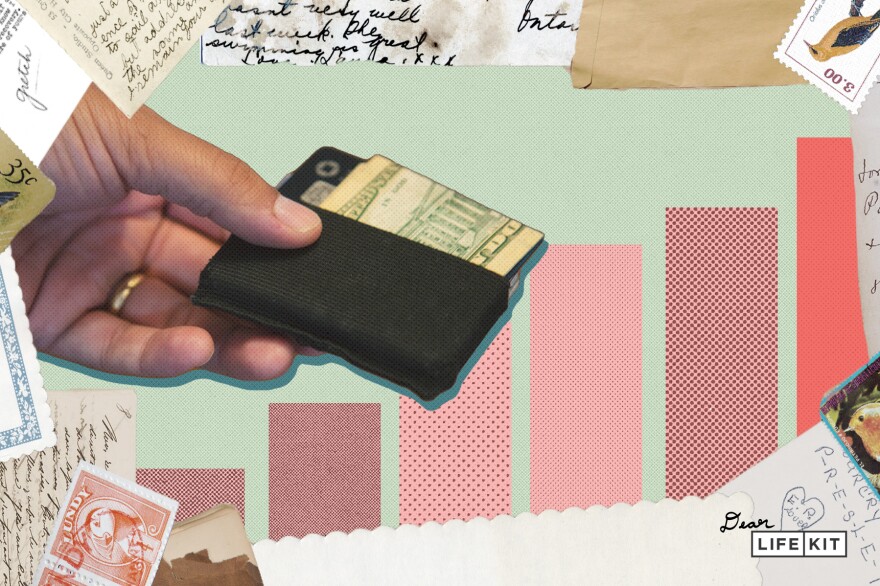HAVE A QUESTION YOU WANT TO ASK DEAR LIFE KIT ANONYMOUSLY? .
Money is one of couples argue. It's no wonder — money impacts our daily lives and our long-term goals. On top of that, talking about finances can be difficult and emotional — and everyone brings their own perspectives and histories to the conversation.
We asked to answer some of your anonymous questions on money and relationships, both romantic and familial.
My husband spent thousands of dollars on impulse buys and hid the credit card bill until it was too big to hide. He turned his accounts over to me and our relationship is recovering, but I still feel extremely resentful. How can I move forward? — Begrudging bookkeeper
Moving forward means that you have to begin where you are, and your starting place is resentful. Of course it is — this was a breach of trust. Not only do you have to get your financial accounts in order and pay back this debt, but you also have to deal with the idea that your partner, somebody that you trust, has done something without your knowledge. There's a reason your husband kept his spending hidden from you. He knew it was going to be an issue.
I would say, share where you're coming from. Share your resentment, as hard as it is to talk about. Share how this affects you. And look for solutions in terms of what was driving his impulsivity with money.
Your husband may have very different ideas about managing money, different priorities or a different relationship with his impulses than you do. As the two of you work on this together, you may discover that your husband is more motivated by avoiding damage to your relationship, than by having the same intrinsic motivation as you when it comes to money. This is a really important opportunity to look not just at the safety in your financial lives together, but at how this impacts the intimacy and trust between the two of you.
My 12-year-old has ADHD. We've been working on financial literacy at home but he still loves to spend money as soon as he gets it. Is there a way to take his ADHD into account when we teach him about money? — Feeling spent
All of us have different ways that we relate to money. Some of us are natural savers and some of us want to spend every penny that comes through our fingers. Honestly, it's not always that important to know exactly where this drive or behavior comes from.
One thing that can help and works with your son's ADHD diagnosis, and that also, I think, works for a lot of us regardless of our neurotypical status, is to make a decision ahead of time for where we want our money to go: How much of that is going to be saved? How much of it is going to be invested? How much of it is going to charity? And how much of it is going to be spent? By asking those questions, we put sort of guardrails on our spending ahead of time.
Once you and your son work out how much money is appropriate for spending, then I would encourage you to really let him experience how he's going to spend that money. At least if he's spending it impulsively, he's doing it safely.
My partner and I aren't married, but we're buying a house together. We earn similar salaries, but due to my partner's student loans, I've been able to stash away significantly more and will be covering most of the down payment. What's a fair way to split expenses moving forward? And how should ownership of the house be split between us? — Even Steven
Fair is such a tricky concept. Fair can actually mean different things in different circumstances and to different people. We often think of "fair" as being equal — that both people are able to put in the exact same amount. But in this case, what you're discovering is that you and your partner have different financial obligations, and so that means a proportional split may actually work better for you. Maybe look at what your expenses are, relative to your income and think about splitting the contribution for the house in that respect.
In terms of moving forward and splitting the ownership of the house, that's really up to the two of you. This is one of those great opportunities to really focus on what I call financial intimacy. There's no right answer, but what you should discuss is the idea of vulnerability and safety. You may feel more vulnerable putting in more money than your partner. What would make you feel safe and supported? Talk about what a commitment to this financial partnership looks like and what you envision for the future of your relationship.
Talk through all of the thorny things, so that you know everything has been covered and there are no hidden dark corners when it comes to what it is that you all decide to co-create together, both financially and in terms of your relationship.
Have a question you want to ask Dear Life Kit? Whether it's about family, friendship, work conflict or something else, .
Listen to Life Kit on and , or sign up for our .
Copyright 2022 NPR. To see more, visit https://www.npr.org.









